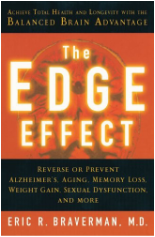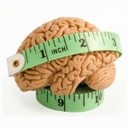 Dale Bredesen
Dale Bredesen What constitutes crazy talk with respect to Alzheimer's treatment may be a matter of opinion. Click 'Read More' below to see where the battle lines are being drawn.
New content for this site is on pause while I write a biography of neuroscience researcher and meditation teacher Shinzen Young. Feel free to browse. Reach out to me if you wish. Check out my new webpage for the book at: www.shinzenbook.com
The most exciting frontier in human knowledge right now is the human brain. We focus on sharing research that has a practical bent: food, exercise, sleep, memory improvement, supplements and so on. We also cover personal experiences with brain and mind training. Occasional guest writers share their perspectives on brain enhancement and scientific discovery. Enjoy!
|
By Paddy Kamen, publisher BetterBrainBetterLife.com  Dale Bredesen Dale Bredesen Is it possible to turn Alzheimer’s around, to have someone walk back from a diagnosis, return to work, recall foreign languages that were lost to them, and re-grow hippocampal volume? The latest research says yes, but is that research sound? This article covers the details of this groundbreaking research, along with criticism of it. What constitutes crazy talk with respect to Alzheimer's treatment may be a matter of opinion. Click 'Read More' below to see where the battle lines are being drawn.
1 Comment
 E-Readers are Great, but Your Brain Needs Sleep! By Paddy Kamen, Publisher, BetterBrainBetterLife Did you receive an e-reader as a gift this year? If so, lucky you: they are excellent travel companions and can make the reading experience better (I like the Kindle notes and highlights features and use an iPad also). However, reading from a light-emitting (LE) e-reading device before bed can seriously disrupt your sleep, according to research from Brigham and Women’s Hospital (BWH) in Boston, MA.  Deborah Clegg, Ph.D. Deborah Clegg, Ph.D. The mouse equivalent of a diet of cheeseburgers and fries causes inflammation in the male mouse brain. But would it do the same for females? No one had bothered studying that until Deborah Clegg, Ph.D. came along. What Clegg discovered may have profound implications for the human brain — and for how we eat. “We knew that a junk food diet causes inflammation in the male mouse brain. We wanted to find out if the same was true for females. In humans, women are less affected in their overall health by weight gain than are men and we were hoping to discover something about this difference,” says Clegg, research scientist and assistant professor, the Diabetes and Obesity Research Institute, Cedars-Sinai Medical Center in Los Angeles. But female rodents are more challenging to work with in the lab, because they go through hormonal cycles every three-to-four days. “Females are rarely used in research because of their fluctuating hormones,” said Clegg, in an interview with BetterBrainBetterLife.com. “But we controlled for this and gave them exactly the same diet as the males. Both sexes gained exactly the same amount of weight.”  The Edge Effect, by Eric Braverman gives us vital information on the brain and personality. Melissa Fougere, a naturopathic doctor with a master's degree in neuroscience, finds Braverman's method helps many of her patients, and in a myriad of ways. You too can use this fascinating technique to begin to better understand yourself or those you care about. Read on!  By Dr. Melissa Fougere When was the last time you felt like the best version of yourself? Do you feel balanced? Are you acting in accord with your true nature? Or have you lost your edge? Disease and symptoms of poor health are messages from the body, a sign that things are not functioning well. It‘s tempting to cover them up with medications, to drink coffee for energy, smoke cigarettes for concentration, to take sleeping pill for insomnia, or use antidepressants to improve your mood. Our physical and emotional symptoms, however, are signs that something needs to be investigated. Once we understand that chronic fatigue, irritability, anxiety, an inability to lose weight, and cravings for sugar, carbohydrates or dairy products are indications that our neural chemistry is in disharmony, we can work towards achieving the amazing health and vitality we were born for.  Melissa Fougere, N.D. Melissa Fougere, N.D. It's Amazing How Much Digestion Affects Mood, Cognition, Energy, and Anxiety Levels Can you recall having had a gut-wrenching experience? Do you get nausea when you're stressed out? Do you experience “butterflies” before a big event? Do you ever have a gut feeling about something? Underlying all these physical and emotional sensations is an often-overlooked network of neurons and nerves that line the tubes and organs that make up your digestive system, or ‘guts’. This network is so significant it’s often referred to as the ”second brain"!  Mind training is about gaining perspective on who we are and the mystery of the world around us. This TED X talk by Polly Young-Eisendrath, a psychologist and Jungian psychoanalyst practicing in Burlington, Vermont, sheds light on how we might shift perspective and gain happiness. I had the privilege of meeting Young-Eisendrath and meditating in her home in Vermont some years ago. She is a colleague of my meditation teacher, Shinzen Young (they are not related). I sense that Polly is making a wonderful contribution to our world and I consider this talk exemplary. She gives some very practical suggestions for learning to be in the moment, and for putting our experience in perspective. This is mind training, and as we know, the way we use our minds directly influences our brains. Reduced Grey Matter, and Too Much Plasticity in the Brains of Insomniacs
By Paddy Kamen, Publisher, BetterBrainBetterLife.com Having trouble sleeping? Chronic insomnia is bad for your health, and might contribute to Alzheimer’s disease. If you’re an insomniac, your brain may even be losing grey matter. Two recent research studies highlight differences in the brains of people with sleep problems. A third study breaks new ground in understanding how sleep benefits the brain. Art & Beauty Boost Brain: Three tidbits on art and beauty on mood and stress:
By Paddy Kamen, Publisher, BetterBrainBetterLife.com One: It turns out that music that is considered ‘sad’ can lift your spirits, but only if you also find it beautiful. Research from the Universities of Kent and Limerick tells an interesting story: http://bit.ly/1eh4bel Two: Research from the University of Westminster showed that even a brief visit to an art gallery lowered cortisol (stress hormone) levels: http://bit.ly/1cBTQxo Three: I swear that reading the poetry of ee cummings is good for my brain, and certainly heightens my mood. I came across a most interesting excerpt from a book on ee cummings by Susan Cheever recently in Vanity Fair: http://vnty.fr/Lisb9O. I would also refer you to the poems: http://amzn.to/NmhuEC. In closing…. “Since love grows within you, so beauty grows. For love is the beauty of the soul.” Saint Augustine  By Paddy Kamen, Publisher, BetterBrainBetterLife.com Dangerous Eating Behaviors May Originate Physiology of the Brain There’s no doubt that western cultures emphasize and value thin body types for women. But to what extent are cultural values responsible for eating disorders? The jury is still out on that, but three studies reveal interesting brain deviations in women with anorexia. First Study: Anorexics Have Larger Brain Regions It turns out that anorexics have more gray matter in regions of the brain responsible for taste, satiety and body image. |
Subjects
All
Join Our Mailing List
Promise: Just interesting stuff and not too often! |
